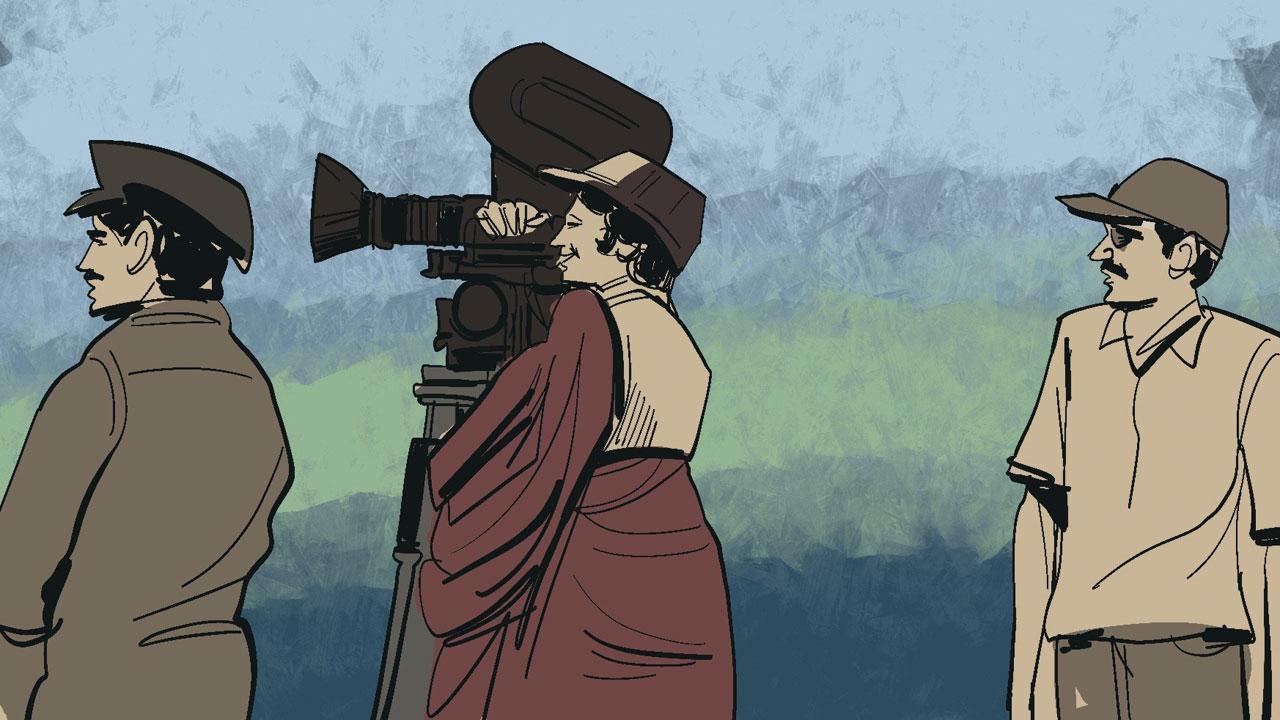It is also an invaluable addition to the body of work by Indian women directors, who are relatively so few

Illustration/Uday Mohite
She’s not famous, nor are her films shown in theatres. But Sumitra never bothered about it,” says writer-activist Anil Awachat, commenting on noted Marathi writer-director Sumitra Bhave, who passed away on April 19 at 78. Bhave herself says, “Numbers don’t matter to me. Films with a huge audience may do nothing for social change, but those with fewer audiences may achieve that… Cinema is immortal. I don’t regret not reaching the audience today. You never know, tomorrow’s audience may appreciate it.” These powerful pearls of wisdom and unshakeable conviction in the value of one’s work, hard-earned after a lifetime making a cinema of the conscience, and more, are shared by Bhave, her colleagues and admirers, in Dr Santosh Pathare’s new, debut documentary on her, Sumitra Bhave: Ek Samantar Prawaas (Sumitra Bhave: A Parallel Journey), in Marathi.
ADVERTISEMENT
Bhave, along with Sunil Sukthankar, her co-director, partner and collaborator of about 35 years, have created a body of over 50 works, including 16 features, shorts and television series (far more if you count individual TV episodes), mainly on social and mental health issues, that is an unparalleled contribution to Indian cinema, and especially Marathi cinema. Coming from a background in social work and self-taught in cinema, many of Bhave’s films, rooted in the Marathi culture, are award-winning, internationally acclaimed films. Her work includes Doghi (Two Sisters, 1995), Dahavi Fa (10th F, 2002), Devrai (Sacred Grove, 2004), Kaasav (Turtle, National Award for Best Feature Film, 2016), Vaastupurush (Guardian Spirit of the House, 2002) and Astu (So Be It, 2013)—the last two being my favourites. Bhave also gave voice to the unseen guru, Maai, in Chaitanya Tamhane’s The Disciple, which is on Netflix. It is also an invaluable addition to the body of work by Indian women directors, who are relatively so few.
Pathare, PhD, is a film activist and General Secretary of the Prabhat Chitra Mandal, one of Mumbai’s oldest film societies. As a documentary, it is straightforward—a series of indoor talking heads, with film clips, for 1h 51mins. But it is a valuable document on the life and films of Bhave who, along with Sukthankar, had a vital and sustained independent film career, and whose contribution remains unmatched in Indian cinema. The film explores Bhave’s philosophy, what she learnt from David Lean and Yasujiro Ozu, and how she approaches filmmaking as the head of a large family. Sukthankar describes how they complemented each other’s filmmaking skills. Although they found it challenging to get wide theatrical release for their films, they did find receptive audiences in the festival and NGO/impact space. I had the pleasure of presenting their Astu (on a family coping with Alzheimer’s) as part of the Women Directors Making Waves season of India on Film, a year-long programme of Indian and South Asian films at the British Film Institute (BFI), London, for which I was Guest Curator, in 2017. The audience was deeply moved and Robin Baker, Head Curator, BFI National Archive, told me “The actress with the elephant [Amruta Subhash] was absolutely magnificent.” Bhave-Sukthankar even had producers pursuing them to make films, such as Devrai and Ek Cup Chya, practically unheard of in Bollywood’s independent space.
It is thrilling to see Bhave’s conviction in her work and legacy emphatically vindicated. Sukthankar joined her when he was just 18, but the duo has deeply influenced a younger generation of outstanding Marathi filmmakers, including Umesh Kulkarni and Sachin Kundalkar, who joined them as assistants and who have also made a mark internationally. Kulkarni’s films include the exquisite Vihir (The Well, Berlin Film Festival), and Deool (Temple); while Sachin Kundalkar’s films include the powerful Gandha, Happy Journey (which Anjali Menon adapted as Koode in Malayalam), and the daring experiment Aiyyaa, starring Rani Mukherji and Prithviraj Sukumaran. There’s also Varun Narvekar, who made Muramba. When your work and legacy remain fiercely independent, despite being directly under the shadow of Bollywood, it is an achievement to be celebrated. Pro tip to Indian filmmakers: unless you pay for professional, high quality English subtitling, be prepared for your film to go out into the world strewn with bloopers, as in this one—“I’m from a nucleus family,” “sink sound,” and “she taught me the nuisances” (ulp).
Meenakshi Shedde is India and South Asia Delegate to the Berlin International Film Festival, National Award-winning critic, curator to festivals worldwide and journalist.
Reach her at meenakshi.shedde@mid-day.com
 Subscribe today by clicking the link and stay updated with the latest news!" Click here!
Subscribe today by clicking the link and stay updated with the latest news!" Click here!






